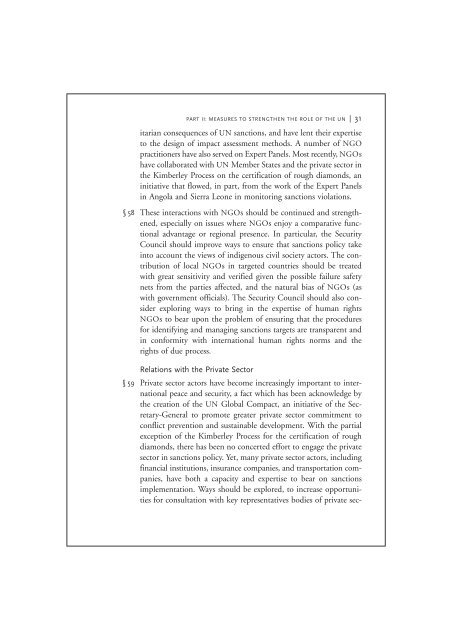Making Targeted Sanctions Effective - Small Arms Survey
Making Targeted Sanctions Effective - Small Arms Survey
Making Targeted Sanctions Effective - Small Arms Survey
Create successful ePaper yourself
Turn your PDF publications into a flip-book with our unique Google optimized e-Paper software.
§ 58<br />
PART II: MEASURES TO STRENGTHEN THE ROLE OF THE UN | 31<br />
itarian consequences of UN sanctions, and have lent their expertise<br />
to the design of impact assessment methods. A number of NGO<br />
practitioners have also served on Expert Panels. Most recently, NGOs<br />
have collaborated with UN Member States and the private sector in<br />
the Kimberley Process on the certification of rough diamonds, an<br />
initiative that flowed, in part, from the work of the Expert Panels<br />
in Angola and Sierra Leone in monitoring sanctions violations.<br />
These interactions with NGOs should be continued and strengthened,<br />
especially on issues where NGOs enjoy a comparative functional<br />
advantage or regional presence. In particular, the Security<br />
Council should improve ways to ensure that sanctions policy take<br />
into account the views of indigenous civil society actors. The contribution<br />
of local NGOs in targeted countries should be treated<br />
with great sensitivity and verified given the possible failure safety<br />
nets from the parties affected, and the natural bias of NGOs (as<br />
with government officials). The Security Council should also consider<br />
exploring ways to bring in the expertise of human rights<br />
NGOs to bear upon the problem of ensuring that the procedures<br />
for identifying and managing sanctions targets are transparent and<br />
in conformity with international human rights norms and the<br />
rights of due process.<br />
Relations with the Private Sector<br />
§ 59 Private sector actors have become increasingly important to international<br />
peace and security, a fact which has been acknowledge by<br />
the creation of the UN Global Compact, an initiative of the Secretary-General<br />
to promote greater private sector commitment to<br />
conflict prevention and sustainable development. With the partial<br />
exception of the Kimberley Process for the certification of rough<br />
diamonds, there has been no concerted effort to engage the private<br />
sector in sanctions policy. Yet, many private sector actors, including<br />
financial institutions, insurance companies, and transportation companies,<br />
have both a capacity and expertise to bear on sanctions<br />
implementation. Ways should be explored, to increase opportunities<br />
for consultation with key representatives bodies of private sec-
















